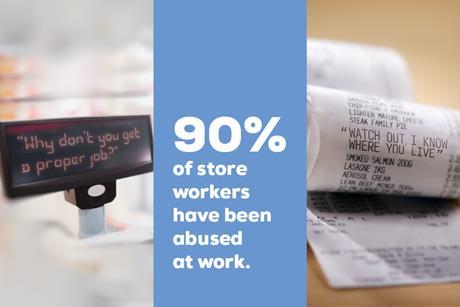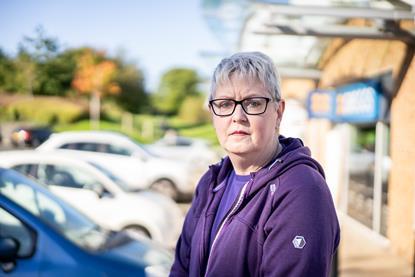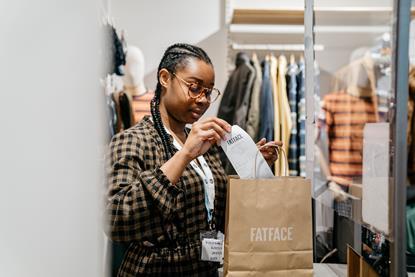
Let's respect retail.
As the latest Retail Trust poll reveals the impact of customer abuse on retail workers, we’ve launched our respect retail campaign to protect the wellbeing of colleagues and stop the intolerance epidemic.
“The only way to describe my job is that it’s like being a human punch bag, every single day,” explained one colleague working for an electrical goods’ store. “It’s not just the occasional rude customer, there’s this widespread lack of understanding from the public, who expect more than ever and insult us or become aggressive if they have to queue or an item is unavailable. It is relentless.”

As we head into the busiest shopping period of the year, the retail sector is in the grip of an intolerance epidemic. The latest Retail Trust poll of over 1,000 colleagues reveals that 90% of respondents have encountered abusive customers – for a third of you, this is happening on a weekly basis – with almost 70% claiming it has got significantly worse in the last one to two years.
With support from the British Retail Consortium, Foot Anstey, Theo Paphitis Retail Group and Usdaw, we’re highlighting the scale and impact of violence and abuse against colleagues, encouraging more positive customer behaviour and supporting employers to adopt a zero-tolerance policy towards abusive customers. Together we can help safeguard the mental and physical wellbeing of our colleagues.
For frontline store workers, delivery drivers and customer services colleagues, it’s not a moment too soon.
“Getting abuse has become part of my job,” reveals Jane, a 51-year-old supermarket checkout supervisor from Flintshire. “On many occasions I’ve had things thrown at me, been called names like ‘useless b**ch’, and been threatened. I once refused to serve an energy drink to a young person and a group of them told me they would wait outside for me after work. We’re just trying to earn a living but it’s made me feel anxious about going to work.”
“We are hearing daily from retail workers who are being shouted at, spat on, threatened and hit at work,” explains Chris Brook-Carter, chief executive of the Retail Trust. “One shopworker was told by a customer that they hoped they got cancer and died. This is having a devastating and long-lasting impact on real people’s lives. Many are extremely anxious about going into work and having to take time off or even quitting. We’ve launched the respect retail campaign to end this intolerance epidemic and make our shops safer.”
There is already a rising tide against unacceptable customer behaviour, kick-started in the wake of the pandemic by the #ShopKind campaign, coordinated by the Association of Convenience Stores on behalf of the Home Office and Crimestoppers. As Helen Dickinson, Chief Executive of the British Retail Consortium who supports both #ShopKind and respect retail tells us, “No one should go to work fearing for their safety, yet our most recent crime survey showed that there were a shocking 450 incidents of violence and abuse against our retail colleagues every single day. People in retail are there to look after customers, help them find what they need, keep shelves stocked and deliver goods – being threatened or assaulted must not be part of the job. We remind customers to shop kind and be respectful and considerate to retail workers and fellow customers.”
A separate Retail Trust YouGov poll of the public reveals nearly half of all UK adults admit to having become annoyed with a shop worker, delivery driver or somebody working in customer services in the last year, with 19% of them raising their voice or losing their temper.
However, there is a disconnection between how customers are behaving and how they perceive the impact of their behaviour, with only 14% saying they regret the way they behaved towards a customer facing worker. The main cause of customer frustration was not enough staff or checkouts (for 62% of respondents), rising prices (62%) and items being out of stock (55%).
According to behavioural psychologist Jo Hemmings, one reason for this is fear. “A lapse in empathy is usually triggered by instability and a lack of control, so customers don’t necessarily realise they’re getting short with somebody,” she explains. “What retail workers are rightly thinking of as abuse is a bad habit adopted by customers taking out their frustrations and it has become worryingly normal because we see it so often.”
In fact, 89% of retail workers said they had witnessed a colleague experiencing customer abuse, which Hemmings believes is down to wider societal factors. “We’re living in particularly unstable physical and financial times so people have raised stress levels,” she explains. “We’re also out of the habit of communicating in real time. We do more online shopping and bashing out an email complaint or leaving a bad review as a keyboard warrior is easy. Sadly, this has spilled over into doing it face-to-face.”
This is something that Cliff Lee, the Retail Trust’s director of wellbeing services echoes: “As a society we rely on technology more than ever and this has somehow dehumanised the process of shopping and offered us an immediacy that we’ve come to expect. It’s also worth remembering that COVID-19 meant two years without us collectively practicing our social skills so customers are finding the shopping process a high stress activity.”
The main cause of customer frustration was items being out of stock (for 95% of respondents), not enough staff or checkouts (92%) and slow service (90%). But considering the ongoing supply chain issues caused by the conflict in Ukraine and increasing economic uncertainty, it is unlikely that these things will become easier any time soon.
So, what can be done to tackle the issue of store abuse, something that 30% of retailers named in our health of retail report as one of the top three issues affecting employee wellbeing?
“Whilst some of these issues will be unavoidable it’s worth looking at queue management and customer service policies with managers and colleagues to ensure they are as customer-friendly as possible,” advises Cliff Lee. “It’s also vital to look out for one another so keep an eye on colleagues and be mindful of signs that they may need your support, such as raised voices, animated body language or the use of bad language. Strength in numbers can be really helpful in de-escalating a situation and letting your colleagues know you’re there to support them.”
If you are on the receiving end of customer abuse, the Retail Trust’s wellbeing training and consultancy lead Andrea Woodside says it’s important to remember that every behaviour has a driver and it might be that the customer feels unheard in other areas of their life and doesn’t have the tools to emotionally regulate. “Remember this person is choosing to use abuse and it’s not a reflection on you, your skills, or your worth. People behave badly for all sorts of reasons, none of which have anything to do with you. The exchange between yourself and an abusive customer doesn’t have to go home with you. It’s important that you debrief with a manager before you leave for the day. Let someone know what’s happened. This doesn’t mean that you need to relive what’s happened but just express how you’re feeling.”
Of the 1,000 colleagues surveyed by the Retail Trust, two thirds said that they would feel safer if employers adopted a publicly visible zero tolerance policy against customer abuse, with over half wanting better security and a third requiring better support and training. Above all, 98% agree that customers need to act more kindly and to remember that retail workers are human beings. Like David, a 35-year-old Co-op store manager from West Yorkshire who told us: “Recently a couple of women came in to the store who were clearly shoplifting. They began to throw stock at me, punched one of my colleagues and on the way out one of the women lunged at me and dug her nails into my head. That night I had to go home and explain to my two young girls why I had a massive cut on my head. It really does weigh on your mental health, and my family worries about my safety. We need to send out a loud and clear message that it is not ok to abuse frontline shop workers.
The key to tackling the intolerance epidemic together is a more open dialogue – with retail colleagues, employers and customers.
Despite two thirds of colleagues admitting that customer abuse made them feel stressed and anxious about going to work (with half admitting it lowered their confidence and a third having thought about leaving retail altogether), there is still a veil of secrecy around the issue. A quarter of all respondents who had been abused by a customer didn’t do anything about it – 26% because they thought they might get into trouble, 20% because they didn’t know how to respond and 29% didn’t feel anyone would help.
Thankfully, a growing number of retailers are joining forces to help tackle the issue and support colleagues, including Theo Paphitis, chairman of Boux Avenue, Ryman, Robert Dyas and London Graphic Centre, who tells us, “Retail colleagues are some of the most passionate and dedicated people out there, ensuring our customers get what they need, as well as being an integral part of our communities. There are many pressures on people at the moment, but there is no excuse for taking frustration out on our retail colleagues, who should be treated with kindness and respect in their workplace, just like anyone else.”
There is also widespread support from Usdaw (the Union of Shop, Distributive and Allied Workers) with general secretary Paddy Lillis saying, “We very much welcome the Retail Trust’s respect retail initiative that seeks to promote respect, kindness and gratitude. This campaign, as well as the strong evidence provided, backs up the work our own Freedom From Fear campaign and highlights the significant issues faced by retail workers simply as a result of going to work. We are saying loud and clear that abuse is not a part of the job.”
“Our message at the Retail Trust is clear,” adds Chris Brook-Carter. “Abuse is never part of anyone’s job and if you’re a retail worker encountering abuse, threats or violence, please do report this to your manager and call the Retail Trust’s free helpline if you need any support dealing with your experiences.”
Respect retail is about respecting Ian, the south-London based delivery driver who should be able to go to work without having a firework hurled at him. It’s about respecting Jane, the checkout supervisor who was told to ‘get a proper job’. It’s about Jo, the convenience store worker who refused to serve an abusive customer who told her ‘I know where you live’ and spray-painted abuse on her car and garden gate.
As we head into the festive shopping season, the Retail Trust is calling on customers to be kind, and supporting retailers and colleagues to better safeguard one another at work, so that together we can tackle the intolerance epidemic and #RespectRetail. Because your health and wellbeing matters, now and all year round.













